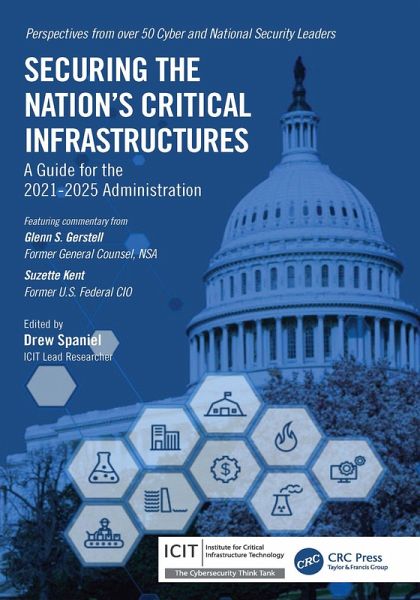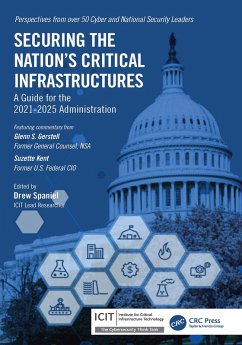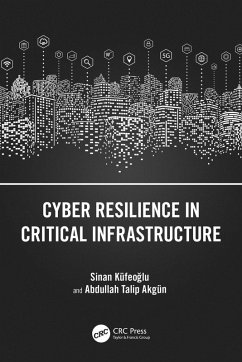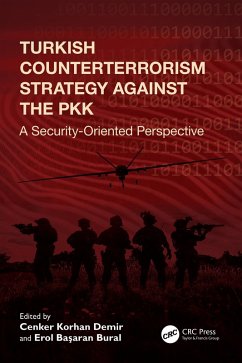
Securing the Nation's Critical Infrastructures (eBook, ePUB)
A Guide for the 2021-2025 Administration
Redaktion: Spaniel, Drew
Versandkostenfrei!
Sofort per Download lieferbar
58,95 €
inkl. MwSt.
Weitere Ausgaben:

PAYBACK Punkte
29 °P sammeln!
Securing the Nation's Critical Infrastructures: A Guide for the 2021-2025 Administration is intended to help the United States Executive administration, legislators, and critical infrastructure decision-makers prioritize cybersecurity, combat emerging threats, craft meaningful policy, embrace modernization, and critically evaluate nascent technologies.The book is divided into 18 chapters that are focused on the critical infrastructure sectors identified in the 2013 National Infrastructure Protection Plan (NIPP), election security, and the security of local and state government. Each chapter fe...
Securing the Nation's Critical Infrastructures: A Guide for the 2021-2025 Administration is intended to help the United States Executive administration, legislators, and critical infrastructure decision-makers prioritize cybersecurity, combat emerging threats, craft meaningful policy, embrace modernization, and critically evaluate nascent technologies.
The book is divided into 18 chapters that are focused on the critical infrastructure sectors identified in the 2013 National Infrastructure Protection Plan (NIPP), election security, and the security of local and state government. Each chapter features viewpoints from an assortment of former government leaders, C-level executives, academics, and other cybersecurity thought leaders. Major cybersecurity incidents involving public sector systems occur with jarringly frequency; however, instead of rising in vigilant alarm against the threats posed to our vital systems, the nation has become desensitized and demoralized. This publication was developed to deconstruct the normalization of cybersecurity inadequacies in our critical infrastructures and to make the challenge of improving our national security posture less daunting and more manageable. To capture a holistic and comprehensive outlook on each critical infrastructure, each chapter includes a foreword that introduces the sector and perspective essays from one or more reputable thought-leaders in that space, on topics such as:
ABOUT ICIT
The Institute for Critical Infrastructure Technology (ICIT) is the nation's leading 501(c)3 cybersecurity think tank providing objective, nonpartisan research, advisory, and education to legislative, commercial, and public-sector stakeholders. Its mission is to cultivate a cybersecurity renaissance that will improve the resiliency of our Nation's 16 critical infrastructure sectors, defend our democratic institutions, and empower generations of cybersecurity leaders. ICIT programs, research, and initiatives support cybersecurity leaders and practitioners across all 16 critical infrastructure sectors and can be leveraged by anyone seeking to better understand cyber risk including policymakers, academia, and businesses of all sizes that are impacted by digital threats.
The book is divided into 18 chapters that are focused on the critical infrastructure sectors identified in the 2013 National Infrastructure Protection Plan (NIPP), election security, and the security of local and state government. Each chapter features viewpoints from an assortment of former government leaders, C-level executives, academics, and other cybersecurity thought leaders. Major cybersecurity incidents involving public sector systems occur with jarringly frequency; however, instead of rising in vigilant alarm against the threats posed to our vital systems, the nation has become desensitized and demoralized. This publication was developed to deconstruct the normalization of cybersecurity inadequacies in our critical infrastructures and to make the challenge of improving our national security posture less daunting and more manageable. To capture a holistic and comprehensive outlook on each critical infrastructure, each chapter includes a foreword that introduces the sector and perspective essays from one or more reputable thought-leaders in that space, on topics such as:
- The State of the Sector (challenges, threats, etc.)
- Emerging Areas for Innovation
- Recommendations for the Future (2021-2025) Cybersecurity Landscape
ABOUT ICIT
The Institute for Critical Infrastructure Technology (ICIT) is the nation's leading 501(c)3 cybersecurity think tank providing objective, nonpartisan research, advisory, and education to legislative, commercial, and public-sector stakeholders. Its mission is to cultivate a cybersecurity renaissance that will improve the resiliency of our Nation's 16 critical infrastructure sectors, defend our democratic institutions, and empower generations of cybersecurity leaders. ICIT programs, research, and initiatives support cybersecurity leaders and practitioners across all 16 critical infrastructure sectors and can be leveraged by anyone seeking to better understand cyber risk including policymakers, academia, and businesses of all sizes that are impacted by digital threats.
Dieser Download kann aus rechtlichen Gründen nur mit Rechnungsadresse in A, B, BG, CY, CZ, D, DK, EW, E, FIN, F, GR, HR, H, IRL, I, LT, L, LR, M, NL, PL, P, R, S, SLO, SK ausgeliefert werden.













